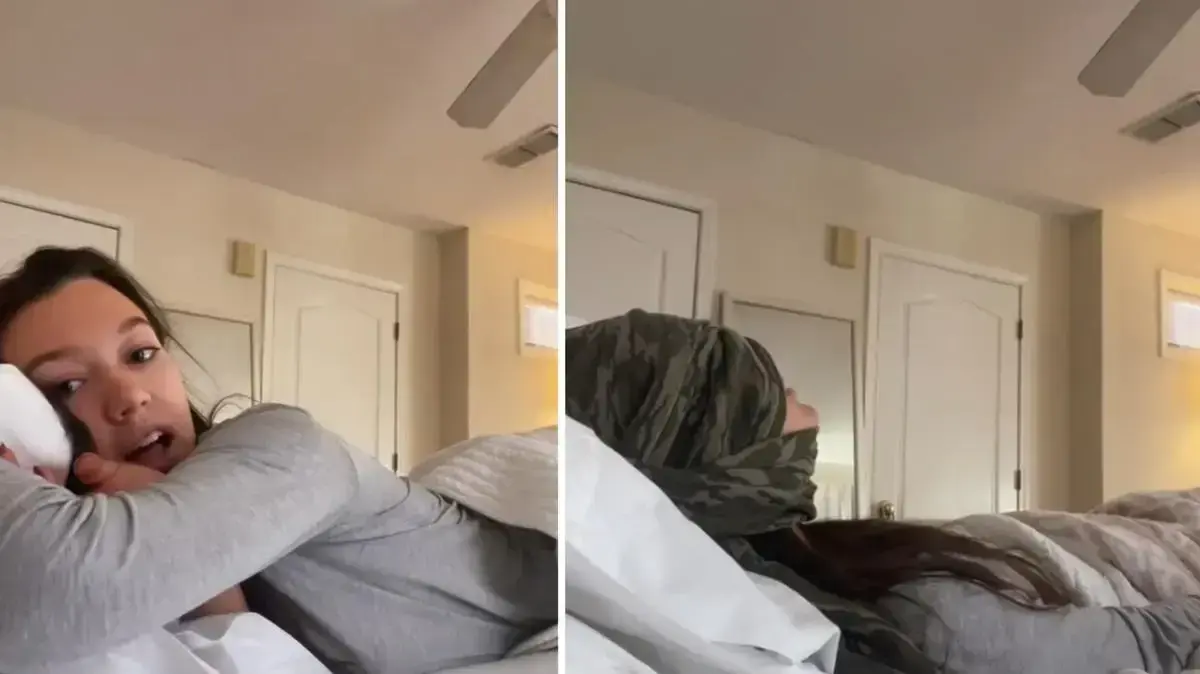Tips so that your sleeping problems do not keep you awake 4:51
(CNN) -
Melatonin is a popular over-the-counter sleep aid, touted as a natural way for adults to fall asleep and used by millions of people around the world.
So why wouldn't it be good for kids too?
"There's an opinion that if it's natural, then it may not hurt," said Rebecca Robbins, an associate scientist at Brigham and Women's Hospital in Boston, who studies sleep.
"The truth is, we really don't know the long-term implications of melatonin, for adults or children," he said.
"People think of melatonin as an herb or a supplement, but it is a hormone," said Dr. Cora Collette Breuner, a professor in the department of pediatrics at Seattle Children's Hospital, University of Washington.
Does taking it delay puberty?
Does it delay the start of a menstrual period or make it happen earlier?
Does it affect someone who has a hormone-mediated disease like thyroid disease?
Does it affect something else related to hormones, like insulin and diabetes?
The verdict remains to be seen, ”said Breuner.
advertising
8 ways to get back to sleep after waking up at night
8 useful tips to be able to sleep 1:14
What is melatonin?
Melatonin is secreted by the pineal gland, located deep in the brain from where it is released into the bloodstream.
Melatonin levels regulate the body's natural sleep-wake cycle, or circadian rhythm, adjusting it to day and night.
Melatonin production is activated by darkness and stopped by light.
That's one of the reasons sleep specialists recommend avoiding light before bed and at night, including the blue light emitted by smartphones and laptops.
Research shows that melatonin is best used to treat sleep latency, which is the amount of time it takes someone to fall asleep, Breuner said.
Therefore, it is often used to combat jet lag or adapt to new time zones.
Shift workers and "night owls" who need to delay bedtime and get up early for work also used melatonin successfully, according to a 2018 study, but in conjunction with behavioral therapy.
When it comes to melatonin and children, "recent studies have indicated that the effects of melatonin vary from child to child due to different sleep disorders and variability in circadian rhythms," said Breuner.
In six randomized controlled trials of melatonin treatment in the pediatric population, he said, melatonin decreased the time it took to fall asleep, between 11 and 51 minutes.
"However, these were very small studies with very variable results," said Breuner.
"So I say to parents, 'Are you really considering reducing the amount of time it takes your child to fall asleep by 11 minutes?'"
“I also tell families, this is not something your child should take forever.
No one knows what the long-term effects of taking this are on their child's growth and development, ”added Breuner.
Tips, foods and more to beat insomnia and sleep better
Yoga can help you sleep better 0:54
Unknown effects of using melatonin
Melatonin use appears "to be safe for most children in the short term," according to the National Center for Complementary and Integrative Health, a department of the National Institutes of Health.
But the agency also notes that "there are uncertainties about what dose to use and when to administer it, the effects of using melatonin for long periods of time, and whether the benefits of melatonin outweigh its possible risks."
Documented side effects in children include drowsiness, headaches, agitation, and increased bed-wetting or urination at night.
There is also the possibility of harmful interactions with medications that are sometimes prescribed for allergic children.
The agency also warns that the supplements could affect hormonal development, "including puberty, menstrual cycles, and the overproduction of the hormone prolactin" that causes breast and milk development in women.
No quality control
Because melatonin is sold as a dietary supplement, not a drug, the manufacturers of melatonin are not subject to the scrutiny of the U.S. Food and Drug Administration (FDA) safety measures and approval process. ).
"Some melatonin supplements may not contain what is stated on the product label," warns the NCCIH.
The agency points to a 2017 study that found that the majority of 31 different melatonin supplements purchased in supermarkets and pharmacies and tested contained levels of melatonin that did not match the description on the bottle.
Actual melatonin concentrations ranged from 83% lower to 478% higher than stated on the label of chewable liquids, capsules and tablets, the study found.
"In addition, 26% of the supplements contained serotonin, a hormone that can have harmful effects even at relatively low levels," said the NCCIH.
If you're buying melatonin, "pharmaceutical grade melatonin is the best way to do it," Breuner said.
"It is the highest purity and has the highest scrutiny."
To find that, look for a seal that shows that the product has been tested by the Dietary Supplement Verification Program of the U.S. Pharmacopeia Convention, an independent, non-profit organization.
What is the correct dosage?
However, even when properly made and packaged, melatonin sells at levels that far exceed the amount needed to induce sleep, Breuner said.
In original studies from the late 1980s, melatonin successfully induced sleep "0.5 to 1.0 milligrams a day at night," instead of the 5 to 200 milligrams that can be purchased today. stores or on the Internet.
Currently, studies are being done using "micrograms, so it would not be 5 milligrams but 5,000 micrograms," Breuner said.
“America has an extra is better type of culture, but melatonin shouldn't be used that way.
A small dose is very helpful, ”Robbins said.
Talk to a pediatrician if you are giving melatonin to children.
Lack of knowledge about proper dosage, purity and side effects, Breuner said, are key reasons parents shouldn't give their children melatonin without permission and guidance from a pediatrician.
Another thing is the time to manage it.
Many people take melatonin or give it to their children before bed.
But for it to work, you need to give it to the child "at least two hours before you want them to fall asleep, not right before bedtime," she said.
This allows the hormone to be absorbed and cause drowsiness.
Activating sleep is key.
Most of the sleep difficulties parents see in their children can be resolved with proper "sleep hygiene," Breuner said.
Removing smartphones, tablets, laptops, and televisions that emit blue light at least two hours before bedtime will cause melatonin production to continue buzzing, as will reading or listening to bedtime stories in a dimly lit room, drinking a warm bath or do small stretches.
Done most nights, these actions "activate" the brain to anticipate bedtime, thus making a smooth transition to sleep.
Breuner asks all of his parents to take their son off melatonin for a period of six weeks every three to six months, to ensure that the child's body is still producing melatonin.
She calls it a "washout" period.
"They always look at me like I'm crazy," Beuner said.
"I tell them 'I really, really need you to try to do a wash period where they don't take it for six weeks.'
“One of the things I find with these parents is that if they do, they probably realize 75% of the time that they never needed to give the child melatonin;
actually, they do fine without it, ”he said.
What children may need to consume melatonin?
There are some populations of children for whom melatonin is a blessing, Breuner said.
That is especially true for children diagnosed with autism.
"Children on the spectrum have a lot of difficulty falling asleep or staying asleep," he said, adding that many studies have found that adding doses up to "six, sometimes 10 milligrams at night" can be "very, very Useful".
"For those kids in my office who have been diagnosed with an autism spectrum disorder, I don't even recommend washing."
Breuner said.
“Those families say, 'Please don't do this.
This is the only thing that keeps my son from wandering around the house at night. '
Another group of children who may benefit from melatonin, Breuner said, are children with attention deficit hyperactivity disorder, or ADHD, who take stimulants to help them with school during the day.
"They may still feel the stimulant at night and it is very difficult for the child to relax," she said.
“Or the medicine is gone and they can't focus and organize enough to go to sleep.
So parents are asking for melatonin to help their children focus and organize their sleep hygiene routine.
The final conclusion for parents?
Don't be rebellious and don't start doing this yourself.
They really, really need to talk to their pediatrician about it, ”said Breuner.
They should make sure that melatonin, or any sleep aid, does not interfere with another medicine the child is taking, such as asthma steroids.
"And please give your child a break every three to six months to see if he is doing well without any medication, along with some hugs, lullabies, and proper sleep hygiene."
Hormones Melatonin









